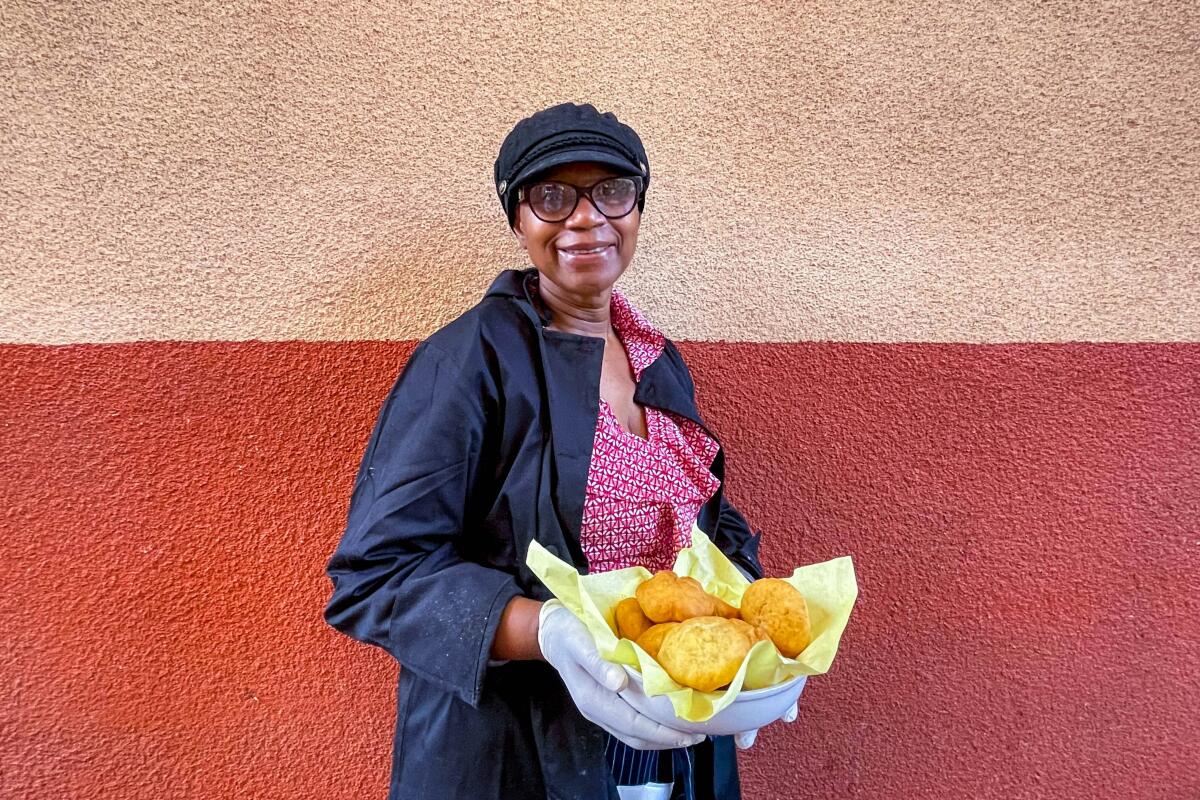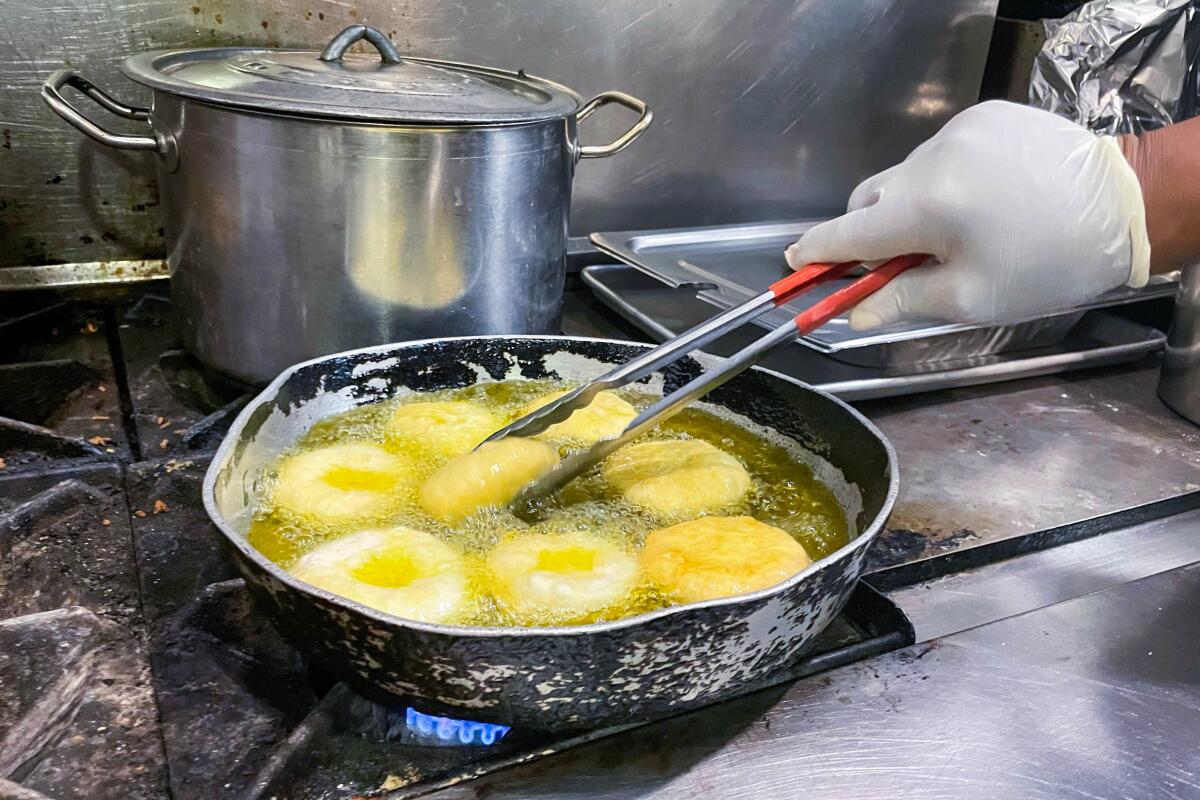Natural History Museum looks at L.A. community through the lens of bread

- Share via
Chef Marlene Beckford remembers her mother’s festival bread and fried dumplings, the simple, savory and affordable balls of hand-kneaded dough that Beckford and her siblings enjoyed throughout their childhood in Jamaica; the food served as a testament to their mother’s resilience.
This week Beckford’s memories and culinary tribute to her mom are helping to kick off “Kneaded: L.A. Bread Stories,” a new digital exhibition created by the Natural History Museum of Los Angeles County that uses videos and interviews to focus on local bread makers and the cultural ties that bind them.
“There were days at home with my mom and dad where we just didn’t have enough money to buy food,” Beckford said. After long hours cooking for the staff of a large food-manufacturing company, her mother would return home and fashion a meal out of whatever she could.
Sometimes it was festival bread, made with a bit of sugar and cornmeal, and sometimes it was fried dumplings. Both of them are dense yet fluffy fried rolls with crisped outer shells served at Beckford’s Leimert Park restaurant, Ackee Bamboo Jamaican Cuisine, alongside entrées such as curries, jerk chicken and salt cod. “She might not have [had] enough meat or rice, but we always had flour,” she said, “so she would make fried dumplings and we would go outside and get some fresh mint and boil mint tea, which is what she would give us as children to go to bed at night.”
At Ackee Bamboo, Beckford hand-kneads the dough for her breads, building the mixtures without the guidance of a measuring cup or spoons; then she lets them proof for only a few minutes before forming each sphere and adding them, one at a time, to a deep pan of oil bubbling on low. The festival bread is so popular that some guests request extras — as many as 15 pieces. The chef-owner estimates the restaurant produces 3,000 to 5,000 rolls each week. They help her to serve the community, Beckford says: When anyone in need asks for food, she’ll give them a few pieces along with a drink — something she says her mother would have wanted her to do.

For Milena Acosta, the museum’s community engagement manager, cultures can be bonded by bread: It’s nourishing, it can be symbolic or hold religious meaning, and it’s a sort of universal language understood across time and continents. Here in Los Angeles, almost everyone has a favorite bakery or memories tied to certain breads. The months-long project at NHMLAC was spurred on by a simple discussion among employees about conchas and whose preferred panadería is better.
“Sometimes it’s in your neighborhood but sometimes it’s more emotionally close to you: You might drive to East Hollywood from the San Gabriel Valley because that’s where you grew up eating that bread, and that’s comforting,” Acosta said. “Bread is culture, and we’re excited to talk about culture and represent the diversity of this thriving and vibrant L.A. that we live in through this lens.”
The series will release content online and over social media, dropping interviews, behind-the-scenes videos and photo essays every month through November, with a possible extension into December touching upon holiday bread. As it stands, nearly 40 L.A. chefs and bakers will be featured with spotlights on their breads — and other items made from ground grain — that originated in Egyptian, Armenian, African, East Asian, Native American and other cultures.
The series will feature Middle Eastern unleavened bread, a vegan spin on Filipino pan de sal, puff puff from Cameroon, and Indigenous acorn bread that’s been made in California for centuries. There will be generational bakeries that tell the story of passing the torch, an LGBTQ operation discussing the legislative symbolism of something as simple as a baked cake, and a soul-food institution sharing the importance of its passed-down cornbread recipe. The exhibition also will pull from the museum’s extensive collection of artifacts, which includes delivery trucks and uniforms from Culver City’s once-ubiquitous Helms Bakery, tracing bread’s international paths to Los Angeles, then and now.
Come fall, and dependent on COVID-19 case rates and public-health safety, the Natural History Museum hopes to host an in-person event celebrating bread and “Kneaded’s” highlighted bakers.
“The goal is to take people on a bread tour around L.A.,” Acosta said. “We’re not trying to say, ‘This is the best Armenian bread in the world.’ There’s no way to do that, and that’s the whole point: Everyone has their spots.” Museum officials are hoping Angelenos will share their own favorite bakeries and cultural breads through comments and by using the hashtag #KneadedLA.
For vegan baker Justine Hernandez, who grew up in Los Angeles, being asked to participate in the series was surreal not only because she spent her childhood visiting the museum but because she feels it helps signal an embrace of plant-based bakeries more generally, and of her Frogtown operation, Just What I Kneaded.
“I hope it inspires people to take that leap and create more all-vegan restaurants without it being a thing,” she said, and “without that fear of, ‘No one’s going to be here’ or ‘We aren’t as good as restaurants that serve dairy or animal products.’”
It was hard to convince her business partners that she could succeed without serving eggs, but today, Hernandez’s once-homespun business is a thriving cafe that builds upon recipes — and even a sourdough starter — made by and with her Polish grandmother, whose story, along with so many others’, will debut in the new series.
Find more at nhm.org/kneadedla.
More to Read
Eat your way across L.A.
Get our weekly Tasting Notes newsletter for reviews, news and more.
You may occasionally receive promotional content from the Los Angeles Times.











